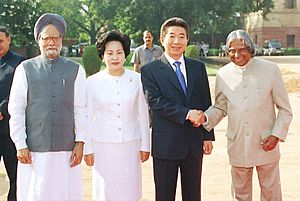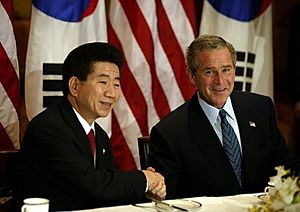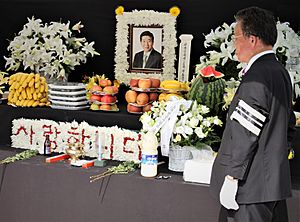Roh Moo-hyun facts for kids
Quick facts for kids
Roh Moo-hyun
GOM
|
|
|---|---|
|
노무현
盧武鉉 |
|
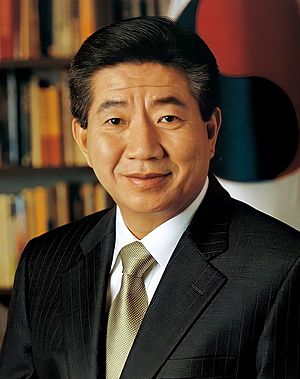
Official portrait, 2003
|
|
| 9th President of South Korea | |
| In office 25 February 2003 –
|
|
| Prime Minister |
|
| Preceded by | Kim Dae-jung |
| Succeeded by | Lee Myung-bak |
| 6th Minister of Oceans and Fisheries | |
| In office 7 August 2000 – 25 March 2001 |
|
| President | Kim Dae-jung |
| Prime Minister | Lee Han-dong |
| Preceded by | Lee Hang-kyu |
| Succeeded by | Chung Woo-taik |
| Member of the National Assembly | |
| In office 22 July 1998 – 29 May 2000 |
|
| Preceded by | Lee Myung-bak |
| Succeeded by | Chung In-bong |
| Constituency | Jongno (Seoul) |
| In office 30 May 1988 – 29 May 1992 |
|
| Preceded by | Park Chan-jong, Kim Jung-kil |
| Succeeded by | Hur Sam-soo |
| Constituency | Dong (Busan) |
| Personal details | |
| Born | 1 September 1946 Bongha Village, South Gyeongsang, Korea |
| Died | 23 May 2009 (aged 62) Bongha Village, South Gyeongsang, South Korea |
| Resting place | Bongha Village, South Gyeongsang, South Korea |
| Nationality | South Korean |
| Political party |
|
| Spouse |
Kwon Yang-sook
(m. 1972) |
| Education | Busan Commercial High School |
| Signature |  |
| Military service | |
| Branch/service | Republic of Korea Army |
| Years of service | 1968–1971 |
| Rank | Corporal (Korean: Sangbyeong) |
| Korean name | |
| Hangul | |
| Hanja | |
| Revised Romanization | No Mu(-)hyeon |
| McCune–Reischauer | No Muhyŏn |
Roh Moo-hyun (Korean: 노무현; Hanja: 盧武鉉; RR: No Muhyeon; Korean pronunciation: [no muçʌn]; 1 September 1946 – 23 May 2009) was a South Korean politician and lawyer. He served as the ninth President of South Korea from 2003 to 2008.
Before becoming president, Roh worked as a lawyer. He focused on protecting the human rights of students who protested against the government. Later, his political goal was to reduce regionalism in South Korean politics. This means he wanted to stop people from only supporting politicians from their own region. He became very popular with young internet users, which helped him win the presidential election.
Roh's election was important because it brought a new group of politicians to power. These were people who had protested against strict rule when they were students. They wanted a friendly approach towards North Korea, even if it meant changes in relations with the United States. Roh was also the first South Korean president born after Japan's rule over Korea ended.
During his time as president, South Korea received high marks for press freedom. The value of the South Korean won currency was also very strong. For the first time, South Korea became the 10th largest economy in the world. The country's wealth per person also grew significantly.
However, Roh faced strong opposition from other political parties and the media. Many of his plans, like moving the capital city, did not make much progress. After leaving office, Roh returned to his hometown. He lived a simple life and shared it through his blog. He also started a website to encourage healthy online discussions. Later, he faced investigations regarding financial matters. Roh Moo-hyun died on 23 May 2009. After his death, many people visited his hometown. Public opinion about him improved, and in a 2019 poll, he was named the most popular president in South Korean history.
Contents
Roh Moo-hyun's Early Life and Education
Roh was born on 1 September 1946, into a farming family. His hometown was Bongha Village in southeastern South Korea. He was the youngest of five children. In 1953, he started elementary school. He was a good student but often missed school to help his parents. In sixth grade, he became the school president. In middle school, he tried to organize a student protest and was suspended.
Roh decided to become a lawyer because his older brother, who had studied law, died in a car accident. Roh studied on his own and passed the bar exam in 1975. In South Korea, you don't always need a college degree to take this exam. In 1977, he became a judge but left in 1978 to become a lawyer.
In 1981, he defended students who were wrongly held for having banned books. This made him want to become a human rights lawyer. He worked with other lawyers to show that the case was unfair. He argued that the National Security Act (South Korea) itself should be reviewed.
In 1985, he became involved in citizen movements. He opposed the strict government rule in South Korea at the time. He joined the June Democracy Movement in 1987, which pushed for more democracy. That same year, he was jailed while investigating the death of a factory worker during a strike. He was released after 20 days due to public pressure. However, his lawyer's license was taken away for a while. Later, it was given back, and he started a law firm called Haemaru.
Roh was baptized as a Catholic in 1986. He later stopped practicing Catholicism but still identified as Catholic. In his later years, he was non-religious but practiced some forms of Mahayana Buddhism.
Roh Moo-hyun's Start in Politics
Roh entered politics in 1988. He joined the Reunification Democratic Party. That same year, he was elected to the National Assembly, which is like the country's parliament. He became well-known for questioning the government about corruption during a public hearing.
In 1990, his party merged with another to form the Democratic Liberal Party. Roh did not join this new party. He said it was a "betrayal against the democracy movement."
In 1991, a newspaper article claimed Roh had hidden wealth. Roh sued the paper and won, but he lost his election for his seat. He also lost elections for mayor of Busan in 1995 and for an Assembly seat in Seoul in 1996.
Later, Roh decided to work with Kim Dae-jung to "bring the military government and their political heir into justice." He supported Kim Dae-jung in the 1997 presidential election. Roh returned to the National Assembly in 1998 after winning a special election.
In 2000, Roh ran for the National Assembly again in Busan. He wanted to help overcome regionalism in Korean politics. He lost this election, but his supporters formed "Nosamo," the first political fan club in Korea. They were inspired by his goal to end regionalism. In 2000, Roh became the Minister of Maritime Affairs and Fisheries. This was his main government experience before becoming president.
Roh gained public attention during his party's presidential candidate selection. This selection allowed not only party members but also local citizens to vote. At first, his approval rating was low, but his speeches helped him gain many supporters. He eventually won his party's nomination. On 19 December 2002, Roh won the presidency by a small margin. Before his inauguration in 2003, he said he wanted to make "discussion" a key part of the government.
Roh Moo-hyun's Presidency (2003–2008)
Roh called his government the "Participatory Government." He wanted to bring in many new ideas. His goals included continuing the Sunshine Policy with North Korea. This policy aimed for more engagement with North Korea. He also wanted to make Korea a business center in Northeast Asia. Other goals included improving social welfare, developing underdeveloped areas, stopping corruption, and reforming education and taxes. He also aimed to change relations with the United States and Japan.
Roh faced strong opposition because his plans to stop corruption involved many changes. He even held a TV discussion to address concerns from prosecutors. They said he appointed people without asking a special committee. Roh argued that the committee itself needed to change. Three months into his presidency, he worried about the strong opposition he faced.
Roh also worked on free trade agreements. He pushed for these agreements despite opposition from some groups, especially farmers.
Uri Party and Impeachment
In 2003, Roh and his supporters left their old party to form a new one, the Uri Party. Before the National Assembly elections, Roh publicly supported the Uri Party. This was seen as a violation of the rule that a president should be neutral in elections. Because he refused to apologize, the opposition parties voted to impeach him on 12 March 2004. The vote was 193 to 2. Roh's supporters tried to stop the vote physically. His presidential powers were suspended, and Prime Minister Goh Kun became the acting president.
The public largely opposed the attempt to impeach Roh. Many people protested against it. Even though Roh's popularity was around 30% before, it went up after the impeachment vote. People saw it as a struggle against political reform. In the April 2004 parliamentary election, the Uri Party won most of the seats, showing public support for Roh.
On 14 May 2004, the Constitutional Court overturned the impeachment decision. This meant Roh was back as president. After this, Roh officially joined the Uri Party, making it the ruling party. It was the first time a liberal party had a majority in the National Assembly.
After Reinstatement
Roh wanted to spread wealth more evenly across the country, not just in Seoul. He proposed moving the capital city about 100 miles away to South Chungcheong Province. He had promised this during his campaign. However, the Constitutional Court ruled that moving the capital was against the constitution. This was a big setback for Roh. His plan was then changed to create an "administrative capital," but this plan has not been fully completed.
People also started to worry about the economy. Even though exports were high, the economy's growth was slower than before. Regulations increased, and housing prices in Seoul became very high. Roh responded by saying his government was making the country more competitive and strengthening the economy. However, his party, the Uri Party, lost many elections and eventually changed its name to the Democratic Party.
Roh's goal to make Korea an international business hub did not fully happen. Foreign investors left the country due to investigations into a bank sale. When housing prices soared, Roh introduced a property tax on expensive real estate. This helped slow down the housing bubble but was unpopular with the wealthy. He also increased welfare spending and hired more civil servants.
One of his more successful efforts was the Free Trade Agreement (FTA) with the United States. This agreement was finalized in April 2007 after many months of talks.
Grand Coalition Plan
Because of the capital city controversy and economic concerns, the Uri Party lost popularity. After losing many local elections in 2005, the Uri Party lost its majority in the National Assembly. Roh then suggested forming a "grand coalition" with the opposition Grand National Party. He believed his low approval rating made it hard to govern alone. He even offered to give up some of his power or resign if the coalition happened.
This idea caused another big debate. Many people thought his plan was "reckless." Supporters of his party were angry because he said his party was not very different from the conservative opposition. The Grand National Party refused to join. Roh's plan failed because it did not get enough support.
Foreign Relations During Roh's Presidency
United States
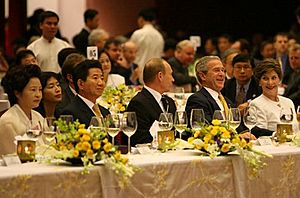
Before becoming president, Roh was seen by some as being against the United States. This was not a problem during his election campaign. In 2002, there was public anger towards the U.S. after two South Korean middle school girls were killed by a U.S. Army vehicle. Roh's government wanted the American soldiers involved to be tried in South Korea, even though the U.S. said it was their responsibility.
However, apart from his policy towards North Korea, Roh generally supported the United States. He worked to improve relations with North Korea. He became the first president to walk across the border to meet Kim Jong-il. He also sent troops to support the U.S. in the Iraq War. He said this was a peacekeeping mission needed to gain U.S. favor in solving the North Korean nuclear crisis. He also pushed for the KORUS FTA. In 2004, Roh's government agreed with the U.S. to move all U.S. forces out of the capital city to Camp Humphreys.
In February 2006, Roh announced that South Korea would start talks with the United States for a free trade agreement. In April 2007, Roh held an emergency meeting to discuss the impact of the Virginia Tech massacre (a shooting by a South Korean student in the U.S.) on relations between South Korea and the U.S. He issued messages of condolence.
Former U.S. Secretary of Defense Robert Gates later described Roh as "anti-American and probably a little crazy" in his book. Gates was surprised when Roh told him in 2007 that the two biggest security threats in Asia were the United States and Japan.
Japan
Relations between South Korea and Japan were good when Roh became president. However, his first visit to Japan in 2003 was on a date that was also Korean Memorial Day.
During his visit, Roh said he would not seek more apologies from Japan for its colonial occupation. He hoped this would help maintain a friendly relationship. However, some worried that Japan might see this as an end to its responsibility for the past.
Despite Roh's hopes, relations with Japan worsened. In 2005, it was reported that Roh's government suggested to the U.S. that Japan be considered a "hypothetical enemy." This was due to public feelings against Japan and a dispute over the Liancourt Rocks (Dokdo islets).
In a speech on 25 April 2006, Roh said he did not want another apology from Japan. But he demanded that Japan act in line with its past apologies.
Retirement and Later Life (2008-2009)
After leaving office, Roh retired to Bongha Maeul, his small hometown village. This was different from past presidents who usually retired to heavily guarded homes in Seoul. Bongha, a village of 121 people, became a popular tourist spot because Roh lived there.
In early 2009, investigations began into financial matters involving Roh's family and aides. Roh stated on his website that his family had requested and received money, but he claimed he did not know about it before his retirement. By May 2009, prosecutors questioned Roh's wife, son, and then Roh himself. He apologized to the public, saying he was "overwhelmed by shame." Roh Moo-hyun died on 23 May 2009.
Roh Moo-hyun's Death
Roh Moo-Hyun died about three months before former President Kim Dae-jung passed away in August 2009.
The 8th president, Kim Dae-jung, said that "President Roh Moo-hyun loved Koreans more than any other presidents." The 10th president, Lee Myung-bak, called the news "truly unbelievable and deeply saddening."
A State Funeral was held from May 23 to May 29, 2009. Many important people attended, including President Lee Myung-bak and former presidents Kim Dae-jung and Kim Young-sam. The funeral started in his hometown, Bong-Ha village. His body was then taken to Seoul and later cremated in Suwon. His ashes were buried back in his hometown.
Roh's public funeral included Buddhist and Catholic traditions. Hundreds of thousands of supporters visited memorial sites across the country.
Roh Moo-hyun's Legacy
In January 2010, a new political party called the "Participation Party" was created. It aimed to "revive the spirit of former President Roh Moo-hyun."
One of Roh's biggest achievements was changing rules for political fundraising. Before his changes, presidential candidates often received large amounts of money secretly. During Roh's first campaign, ordinary citizens donated their piggy banks, showing public support.
The Institute for Future Korea was founded to study and promote Roh Moo-hyun's social ideas.
In 2010, a year after his death, politicians who had been Roh's aides won local elections. In 2012, Han Myeong-sook, who was one of Roh's prime ministers, became the leader of the main opposition party. She officially stated her goal to continue Roh's policies. Although his policies were sometimes seen as failures during his presidency, they have been re-evaluated as liberal and nationalistic.
On the 10th anniversary of his death, former U.S. President George W. Bush paid his respects at Roh's memorial ceremony.
In a 2019 poll by Gallup South Korea, Roh was ranked as the greatest president.
Awards and Honours
National Honours
Foreign Honours
 Algeria:
Algeria:
 Denmark:
Denmark:
 Recipient of Order of the Elephant
Recipient of Order of the Elephant
 Poland:
Poland:
 Recipient of Order of the White Eagle
Recipient of Order of the White Eagle
 Qatar:
Qatar:
 Spain:
Spain:
 Collar of the Order of Civil Merit
Collar of the Order of Civil Merit
 United Kingdom:
United Kingdom:
 Honorary Knight Grand Cross of the Order of the Bath
Honorary Knight Grand Cross of the Order of the Bath
Authored Books
- Roh Moo-hyun (September 1, 1994) (in ko) (1st ed.). Seoul: Sae-teo. ISBN 978-89-87175-19-5.
- ———————— (November 30, 2001) (in ko). Seoul: Hakgojae Books. ISBN 978-89-85846-89-9.
- ———————— (October 15, 2002) (in ko) (1st ed.). Seoul: Happy Reading. ISBN 978-89-89571-07-0.
- ———————— (September 22, 2009) (in ko) (1st ed.). Seoul: Hakgojae Books. ISBN 978-89-5625-096-0.
- ———————— (November 27, 2009) (in ko) (1st ed.). Paju: Dongnyok. ISBN 978-89-7297-608-0.
- ———————— (April 26, 2010) (in ko) (1st ed.). Paju: Dolbegae. ISBN 978-89-7199-386-6.
- ———————— (May 3, 2019). Roh Moo-hyun Foundation. ed (in ko). Roh Moo-hyun's Complete Works. 6. Paju: Dolbegae. ISBN 978-89-7199-947-9.
See also
 In Spanish: Roh Moo-hyun para niños
In Spanish: Roh Moo-hyun para niños
- 2002 South Korean presidential election
- Social liberalism
- U.S.-Korea Free Trade Agreement
 | Laphonza Butler |
 | Daisy Bates |
 | Elizabeth Piper Ensley |


